| This article relies excessively on references to primary sources. Please improve this article by adding secondary or tertiary sources. Find sources: "Toshimaen" – news · newspapers · books · scholar · JSTOR (December 2012) (Learn how and when to remove this message) |
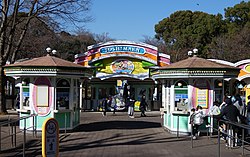 Park entrance Park entrance | |
| Location | Nerima, Tokyo, Japan |
|---|---|
| Coordinates | 35°44′42″N 139°38′43″E / 35.74500°N 139.64528°E / 35.74500; 139.64528 |
| Status | Defunct |
| Opened | 15 September 1926 (1926-09-15) |
| Closed | 31 August 2020 (2020-08-31) |
| Owner | Seibu Group |
| Area | 22 hectares |
Toshimaen (としまえん) was an amusement park in Nerima, Tokyo, Japan, owned by the Seibu Group. It had a variety of rides, including three roller coasters, and a water park with 25 slides and six pools. It closed permanently on August 31, 2020 and was redeveloped into Warner Bros. Studio Tour Tokyo – The Making of Harry Potter which opened on June 16, 2023.
Attractions
Carousel "El Dorado"
The carousel "El Dorado" is Japan's oldest play machine and is a merry-go-round with a long history in the world.
Produced by Hugo Haase in Munich, Germany in 1907, it premiered publicly at the Oktoberfest. After that, it was operated at carnivals held in various parts of Europe. Due to the deterioration of social conditions, it was transferred to the amusement park Steeplechase Park in Coney Island, New York, in 1911, and was named "El Dorado". Celebrities such as former US President Theodore Roosevelt, Marilyn Monroe, and Al Capone also boarded and were loved by New Yorkers.
The amusement park that operated this vehicle was closed in 1964 due to financial difficulties, so it was planned to be disposed of, but Toshimaen bought it for about 100 million yen in 1969 just before it was disposed of. It was loaded into 6 containers in 1970 and sent to Japan. Since the parts were disjointed and the paint had peeled off, the operation started on April 3, 1971 after two years of restoration work under the guidance of experts at the time, such as Japanese carpenters specialized in wooden structures known as miyadaiku, art teachers, and electrical engineers. The restoration cost 200 million yen. A Steeplechase Park admission ticket was found in the vehicle during work.
In 1983, through the Embassy of the United States in Japan and the Consulate-General of Japan in New York, a purchase request came from Coney Island, but Toshimaen replied, "Now, Japanese children are enjoying it," and refused.
Models such as horses are installed on the rotating floor. However, it does not move up and down. The rotating floor is divided into three stages. The outermost floor is the slowest, the middle floor is normal, and the innermost floor rotates the fastest.
The sculpture and decoration are in the Art Nouveau style, and are now a valuable cultural property, and were certified as "Mechanical Engineering Heritage" by the Japan Society of Mechanical Engineers on August 7, 2010.
The Nerima Ward Assembly (練馬区議会) submitted a written opinion to the Governor of Tokyo stating that Carousel El Dorado should be left in the "Nerima Castle Ruins Park" that will be built on the site of Toshimaen. After the park is closed, it will be dismantled and stored in the Seibu Group warehouse.
River pool
Toshimaen was the first in the world to have a river pool (350-meter, doughnut-shaped pool) in 1965. The water park had other facilities as well, such as a children's pool where toddlers could swim in as well, a wave pool, and the Hydropolis with water slides.
Renewal
The park closed on 31 August 2020 and reopened as Warner Bros. Studio Tour Tokyo – The Making of Harry Potter on June 16, 2023. It is the second Harry Potter-themed attraction in Japan after The Wizarding World of Harry Potter in Osaka, and the second Studio Tour dedicated to the Wizarding World (after the Warner Bros. Studio Tour located at Leavesden Studios, London). Not all of the former park's 22 hectares were used for the new theme park; the majority of the former Toshimaen site was purchased by the Tokyo Metropolitan Government after its closure, and is planned to be developed as a large park that serves as a base for use in event of a disaster.
Incident
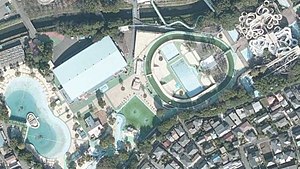 Toshimaen swimming pool (November 2019). The nearly rectangular pool surrounded by the flowing pool on the right of the photo is the site. (Based on an aerial photograph from the Geospatial Information Authority of Japan's Map and Aerial Photograph Viewing Service, Ministry of Land, Infrastructure, Transport and Tourism; original photograph has been cropped and processed) Toshimaen swimming pool (November 2019). The nearly rectangular pool surrounded by the flowing pool on the right of the photo is the site. (Based on an aerial photograph from the Geospatial Information Authority of Japan's Map and Aerial Photograph Viewing Service, Ministry of Land, Infrastructure, Transport and Tourism; original photograph has been cropped and processed) | |
| Date | 15 August 2019 |
|---|---|
| Time | Around 14:00 (JST) |
| Location | 'Fluffy Water Land' pool attraction at Toshimaen amusement park, Nerima-ku, Tokyo |
| Coordinates | 35°44'36.8"N 139°38'41.3"E |
| Also known as | Toshimanen swimming pool fatal accident |
| Cause | Lack of lifejackets and supervision |
| Outcome | "A" (8-year-old girl) deaths |
The drowning incident occurred on 15 August 2019 at the 'Fluffy Water Land' (ふわふわウォーターランド) attraction in Toshimaen, an amusement park that was located in Nerima, Tokyo. This attraction featured water-based inflatable play equipment. A young girl, referred to here as 'A', who was wearing a life jacket, was found floating beneath the play equipment and subsequently drowned.
This incident became the subject of an investigation by the Consumer Affairs Agency. It was concluded that the girl had fallen into the water, slipped under the play equipment, and was unable to escape due to the buoyancy of her life jacket.
In response to this incident, the Ministry of Economy, Trade and Industry established guidelines for the safety of water-based play equipment.
Accident site


The accident occurred at Toshimaen, which opened in 1926, with the pool opening three years later in 1929. The 'Fluffy Water Land' had been in operation since 2016. It was installed in a competitive swimming pool with eight lanes, measuring 50 metres in length, 20 metres in width, and a depth ranging from 1.2 to 1.9 metres. There were areas where someone of person A's height could not touch the bottom. The "Fluffy Water Land" had more than 10 water-based play equipment, known as air toy types. These are professionally referred to as 'air membrane structure toys', which float on the water surface by inflating them with air. They are easy to store when deflated and can be reshaped in various ways, which are their advantages. However, there were no nets or similar installations to prevent entry under the toys. The planning and design of the "Fluffy Water Land" were carried out independently by Toshimaen, and the toys were procured from a manufacturer in China. The toy that person A fell from was large enough for about 15 adults and children to play at once. According to a man quoted by Tokyo Sports, who uses the "Fluffy Water Land" with his children every year, the toys are more than 30 centimetres thick and have a slippery surface, making it impossible for children to climb onto the toys from the water on their own. Even adults would struggle to escape if they ended up under the toys while wearing the life jackets mentioned later.
At the "Fluffy Water Land", users had to be taller than 1.1 metres and were required to wear life jackets provided for drowning prevention and to prevent entry under the toys. The life jackets provided at the "Fluffy Water Land" were solid-structured, using expanded polystyrene for buoyancy, and were shaped like a waistcoat. The waistcoat was worn by putting both arms through and fastening it at the front, with adjustments made accordingly. In addition, users of the "Fluffy Water Land" were verbally asked if they could swim on their own. Many users were also seen wearing armbands, according to eyewitnesses of the accident. At the "Fluffy Water Land", it was not uncommon for people to fall into the water from the toys, and on top of that, there were people who dropped their goggles into the water at a rate of two per hour.
Accident
At the time, A was an 8-year-old girl in her third year of primary school, residing in Asaka City, Saitama Prefecture. On the day of the incident, A, along with her father (hereafter referred to as B), mother (hereafter referred to as C), and one-year-old sister (hereafter referred to as D), visited the pool at Toshimaen. A, who was over 1.1 metres tall, was wearing a life jacket. She began using the pool with B around 1 pm. At approximately 1:30 pm, B lost sight of A and asked the lifeguards to search for her. However, the lifeguards merely used a loudspeaker to call out, "Is A here?" and directed B to the lost child centre, without immediately conducting an underwater search. They asked B to wait until 2 pm.
Just before 2 pm, a lifeguard dived into the water to search for A but was unable to find her. At 2 pm, a routine inspection began, during which all pool users were asked to get out of the water. A was found by a lifeguard around 2:10 pm. She was discovered face down under a mat-like play equipment, approximately 2.5 metres long, 5 metres wide, and 30 centimetres thick, still wearing her life jacket. According to pool patrons who witnessed A being pulled out of the water, she was pale and limp when she was rescued, and a person believed to be C was screaming. A was unconscious and in critical condition. According to witnesses, she received cardiopulmonary resuscitation before being transported to the hospital, where her death was confirmed around 4 pm.
At the time of the accident, there were approximately 270 people using the "Fluffy Water Land", and there were seven lifeguards on duty. It was reported that no abnormalities were observed during the routine inspection at noon, which included underwater checks.
Other
On the day of the incident, Toshimaen cancelled operations at the "Fluffy Water Land" as well as its evening pool operations (Night Pool), and suspended all pool activities from the following day, 16 August. The pool reopened on 23 August, but the rental of large inflatable rings was discontinued, and it was decided that the "Fluffy Water Land" would not operate until the end of the pool season in 2019. The "Fluffy Water Land" remained closed in 2020, leading up to the closure of Toshimaen itself on 31 August of the same year.
Litigation
On 8 May 2020, the bereaved family members B and C of the deceased A filed a civil lawsuit in the Tokyo District Court, claiming that A's death was due to a lack of thorough safety management. They argued that, according to the guidelines of the Japan Air Play Equipment Safety Promotion Association, there should have been at least one supervisor per play equipment and a total of more than ten, but there were only seven in total. They sought a total of approximately ¥ 75 million (£377,600) in damages from Toshimaen, its parent company Seibu Railway, the contractor in charge of surveillance, and the manufacturer and installer of the play equipment. Toshimaen officials attended A's funeral, but did not participate in the condolence visit and did not comply with the out-of-court dispute resolution procedure. In an interview with the Sankei Shimbun, C stated that there had been comments from Toshimaen and others that the accident was unforeseen, and regarding the document received from Toshimaen after the accident, C said, "The content seemed to be blaming each other for the accident, and I didn't feel any sincerity at all," "What do they think of my daughter's life?" and "I didn't feel any sense of apology at all." The pool management company responded to an NHK interview immediately after the accident, stating that they had not anticipated that someone would enter under the play equipment.
The first oral argument took place on 14 September 2020, but all the defendants indicated a willingness to contest the case and asked for the plaintiff's claim to be dismissed. Seibu Railway merely commented, "We offer our condolences again. We will clarify our claims in the lawsuit". Bunshun Online reported that it is certain that the trial will be prolonged, as all four defendant companies are blaming each other for the accident.
On 6 March 2023, a settlement was reached in the Tokyo District Court. The details of the settlement were not disclosed.
Gallery
-
 Toshimaen main gate
Toshimaen main gate
-
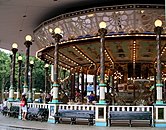 The "Eldorado" carousel. This carousel was formerly located at Steeplechase Park on Coney Island, New York City
The "Eldorado" carousel. This carousel was formerly located at Steeplechase Park on Coney Island, New York City
-
 "Hydropolis" water slides
"Hydropolis" water slides
-
The "Flying Pirates" and the "Troika"
-
An attached hot spring facility called "Niwa-no-yu (庭の湯). It will continue to operate even after the park is closed. A hot spring was discovered during an underground measurement conducted to build a subway called the Toei Ōedo Line.
-
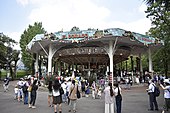 Toshimaen five days before closing
Toshimaen five days before closing
-
 Toshimaen five days before closing
Toshimaen five days before closing
-
 Toshimaen five days before closing
Toshimaen five days before closing
-
 Platform at Toshimaen Station on the Toei Ōedo Line
Platform at Toshimaen Station on the Toei Ōedo Line
-
Toshimaen Station on the Seibu Toshima Line
-
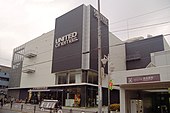 United Cinema Toshimaen is near Toshimaen
United Cinema Toshimaen is near Toshimaen
Access
It was located near Toshimaen Station on the Seibu Toshima Line and Toei Ōedo Line.
References
- "水と緑の遊園地 としまえん|プール、冬は屋外アイススケート、釣り堀も楽しめる遊園地。豊島園駅下車すぐ。". Toshimaen.co.jp. Retrieved 10 August 2011.
- ^ としまえん「カルーセル エルドラド」 - 日本機械学会
- ^ 佐々木隆 (30 July 2020). "としまえんはいつまで?最後の夏休みに乗りたいおすすめベスト5&遊園地王の思い出". るるぶKids. JTBパブリッシング. Retrieved 3 September 2020.
- ^ 榎並秀嗣 (31 July 2020). "世界最古級の回転木馬はどこへ?". 47NEWS. Kyodo News. Retrieved 31 July 2020.
- ^ "としまえん運営部長「世界の宝」回転木馬の稼働願う". 日刊スポーツ. 31 August 2020. Retrieved 3 September 2020.
- おだしんいちろう. カルーセル・エルドラド. 株式会社豊島園. p. 巻末「カルーセル・エルドラド生誕110年を迎えるにあたり」(株式会社豊島園、2017年9月15日)で言及.
- "カルーセルエルドラドの歴史について" (PDF). 共同通信PRWire. p. 2. Retrieved 3 September 2020.
- "都市計画練馬城址公園の事業化に関する意見書". 練馬区議会. Retrieved 24 August 2020.
- "としまえん、94年の歴史に幕 世界最古級の回転木馬「エルドラド」復活の日を待つ". Sponichi Annex. 31 August 2020. Archived from the original on 31 August 2020. Retrieved 31 August 2020.
- "Toshimaen - Tokyo Travel Guide | Planetyze". Planetyze. Retrieved 9 August 2017.
- "【速報】としまえんが8/31に閉園&ハリーポッターのテーマパークへリニューアル計画!オープンはいつ?". Castel.jp. Retrieved 13 August 2020.
- CSIC 2020, p. 19. sfn error: no target: CITEREFCSIC2020 (help)
- ^ CSIC 2020, p. 9. sfn error: no target: CITEREFCSIC2020 (help)
- ^ CSIC 2020, p. 4. sfn error: no target: CITEREFCSIC2020 (help)
- ^ CSIC 2020, pp. 40–41. sfn error: no target: CITEREFCSIC2020 (help)
- "Guidelines on the Safety of Water Play Equipment" (in Japanese). Ministry of Economy, Trade and Industry. 25 December 2020. Archived from the original on 2 March 2024.
- Kamiya, Enka (26 August 2020). "The Unknown History of Toshimaen, Bringing Down the Curtain on 94 Years of History: A Local Reporter's Love". The Tokyo Shimbun (in Japanese).
- ^ "8-Year-Old Girl Dies in Toshimaen Pool Under Floating Play Equipment". The Asahi Shimbun (in Japanese). 15 August 2019.
- ^ "Toshimaen Swimming Pool Fatal Accident, Family of Third-Grade Girl to Sue Management Company". Sankei Shimbun (in Japanese). 7 May 2020.
- Kuribayashi, Hisashi (23 March 2021). "What are the Risks and Safety Measures Related to Water-based Air Play Equipment? We asked experts about their opinions based on the 'report' released by the Consumer Safety Investigation Committee". A Notebook for Creating a Future with Zero Marine Accidents (in Japanese). Archived from the original on 10 August 2022.
- ^ CSIC 2020, p. 17. sfn error: no target: CITEREFCSIC2020 (help)
- ^ CSIC 2020, p. 18. sfn error: no target: CITEREFCSIC2020 (help)
- "A life jacket can be deadly? Toshimaen Pool pointed out in 3 fatal accidents". Tokyo Sports (in Japanese). 16 August 2019.
- CSIC 2020, pp. 10–11. sfn error: no target: CITEREFCSIC2020 (help)
- ^ "An 8-year-old girl drowned in a swimming pool and died in Nerima, Tokyo" (in Japanese). Japan Broadcasting Corporation (NHK). 15 August 2019.
- "Dangers Lurking in Water-Based Play Equipment, No Guidelines, 'Toshimaen' Girl Fatal Accident". Mainichi Shimbun (in Japanese). 31 August 2019.
- "Girl Dies in Swimming Pool, Missing Shortly After Beginning to Play" (in Japanese). Japan Broadcasting Corporation (NHK). 16 August 2019.
- ^ "8-Year-Old Girl Dies in "Toshimaen" Swimming Pool ... Blind Spot That Even Wearing Life Jackets Couldn't Prevent Accident" (in Japanese). Fuji Television. 16 August 2019.
- "Toshimaen Pool Accident: Danger Lurking in 'Water-Based Play Equipment': Urgent Need to Review Safety and Monitoring System". Sankei Shimbun (in Japanese). 22 August 2019.
- "としまえんプール事故 「水上遊具」に潜む危険 安全性、監視体制の見直し急務". 産経ニュース (in Japanese). 産業経済新聞社. 22 August 2019. Archived from the original on 15 September 2021. Retrieved 15 September 2021.
- "プール事故「潜り込み想定せず」". NHKニュース (in Japanese). 日本放送協会. 29 August 2019. Archived from the original on 29 August 2019.
- "としまえん運営会社など争う姿勢 プール事故死訴訟で初弁論". 産経ニュース (in Japanese). 産業経済新聞社. 14 September 2020. Archived from the original on 15 September 2021. Retrieved 15 September 2021.
- 新屋絵理 (14 September 2020). "としまえんプール死亡事故 女児の両親が運営側を提訴". 朝日新聞デジタル (in Japanese). 朝日新聞社. Archived from the original on 15 September 2021. Retrieved 15 September 2021.
- "「としまえん」のプールで小3女児が溺死…責任を押し付け合う"被告4社"の言い分". 文春オンライン (in Japanese). 文藝春秋. 27 September 2020. p. 2. Archived from the original on 15 September 2021. Retrieved 15 September 2021.
- "女児プール死亡事故で和解 19年に「としまえん」で発生". 47NEWS (in Japanese). 共同通信社. 6 March 2023. Archived from the original on 20 May 2023. Retrieved 21 May 2023.
External links
- Toshimaen amusement park Guide and History (in Japanese)
| Districts |
|  | ||||||||||||
|---|---|---|---|---|---|---|---|---|---|---|---|---|---|---|
| Major stations |
| |||||||||||||
| Education |
| |||||||||||||
| Landmarks | ||||||||||||||